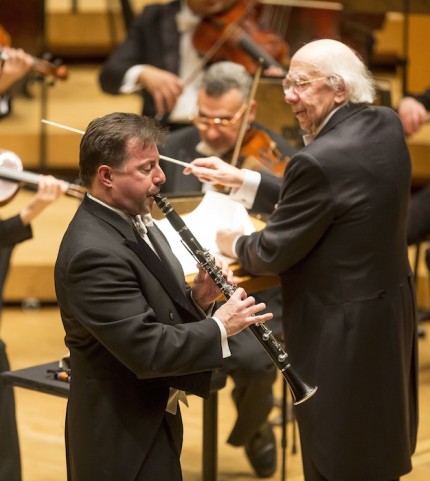Strings to the fore with a Mozart centerpiece from Rozhdestvensky, CSO

Riccardo Muti was to have conducted the current two weeks of Chicago Symphony Orchestra concerts but a fall at his home in Ravenna shortly after his return from the CSO’s recent Asian tour resulted in injuries that required hip surgery.
One week after the news was released, the nature of the accident, the extent of Muti’s injuries and length of recuperation all remain murky, with the CSO still declining to provide details. There have been reports in the Italian press that Muti had, in fact, broken his hip in the fall and that his injuries were more extensive than the “minor accident” indicated by the CSO.
Whatever the case, after six seasons the CSO has had plenty of experience booking substitute maestri due to their music director’s illnesses and accidents. The orchestra has engaged Manfred Honeck for next week’s program, and Gennady Rozhdestvensky stayed in Chicago to lead this week’s concerts.
If the recobbled, substantially strings program heard Thursday night was lighter in style and not on the same level as the extraordinary Shostakovich led by Rozhdestvensky last week, the performances were well played, musicianly and largely rewarding.
Standing on the stage floor sans podium, the 84-year-old conductor uses a violin bow-sized baton that provided intermittent obbligato percussion as it rapped his music stand. At one point the Russian light saber flew out of Rozhdestvensky’s hands–clearly not a novelty, as an extra baton was already in place.
In the first of two solo outings by CSO principals this month, Stephen Williamson was stage front for Mozart’s Clarinet Concerto.
Williamson has been a clear asset to the CSO since becoming principal clarinet in 2011 (leaving aside his flirtation/leave of absence to play with the New York Philharmonic in the 2013-14 season). His technical fluency and elegant yet characterful playing has consistently enlivened the CSO’s performances and provided an important foundation for the orchestra’s woodwind section, which has been somewhat unsettled after losing three principals.
Yet Williamson’s Mozart performance was curiously uneven and took some time to settle in Thursday night. The soloist seemed to be having drainage issues with his clarinet in the opening movement, and he was constantly and loudly clearing his instrument. A few seconds into the slow movement, Williamson broke off playing and asked Rozhdestvensky to start the music over again.
Even with those distractions, Williamson proved a nimble and idiomatic soloist. Playing on a modern instrument rather than the extended-range basset clarinet for which Mozart wrote the concerto, he played with an easy articulation and seamless phrasing, swaying and knee-bending like a jazz musician at a club.
If the Adagio was rather Classical in style and expressively cool, Williamson’s dynamic marking in the hushed closing section was sensitively rendered. The concluding Rondo came off best, sprightly, finely articulated and completely in synch with the music’s relaxed good humor, with Rozhdestvensky and Williamson’s colleagues lending admirable support.
Works for strings dominated the rest of the program.
The evening began with Rakastava by Sibelius, a late stand-in for György Ligeti’s Ramifications. While the loss of one of this season’s few CSO works from the late 20th century is regrettable, there was compensation in the evocative performance delivered by Rozhdestvensky and the musicians.
Originally composed as three song settings for men’s chorus, Sibelius artfully retooled this music for string orchestra, timpani and triangle. The opening section (“The Lover”) is imbued with the spare, lonely luminescence of Sibelius’s best music in this vein. The Northern atmosphere was as eloquently conveyed by the CSO strings as the gentle charm of the middle section (“The Path of the Beloved”). The final section (“Farewell”) flirts with the salon but the tasteful violin and cello solos by Robert Chen and John Sharp kept the lyrical nostalgia within non-sticky parameters, and Rozhdestvensky drew lovely, terraced playing.
Arvo Pärt’s Orient and Occident was another program change from the original season schedule, substituted after Elizabeth Ogonek, one of the CSO’s new composers in residence, failed to deliver her first commission on time.
As indicated by the title, Pärt’s seven-minute miniature contrasts his familiar glowing minimalism with a febrile, undulating theme redolent of Indian music and the muezzin call to prayer. Rozhdestvensky led a solid enough performance though some of the exotic flavor felt smoothed over and greater precision and expressive focus would have made a stronger case for this intriguing music.
The lightish program ended with a similarly worthy performance of Tchaikovsky’s Serenade for Strings. The veteran conductor took tempos a bit slower in this music than has become customary yet his skillful balancing consistently underlined details, as with the cellos’ restless counterpoint in the opening movement. Others have found greater expressive depths in the Elegy, yet Rozhdestvensly’s direction was never less than idiomatic, conveying a lilting grace in the Waltz and bringing vital energy to the very Russian theme of the finale.
The program will be repeated 8 p.m. Friday and Saturday. cso.org; 312-294-3000.
Posted in Performances





Posted Feb 12, 2016 at 7:26 pm by Gerry Ahrens
Thanks, very helpful Lawrence.
We were really hoping Williamson was going to play a basset, and were disappointed that they replaced Ramifications.
The concert is ALSO Tuesday night 2/16 and we are going to be turning in our two front row centerish Gallery tix for a future swap.